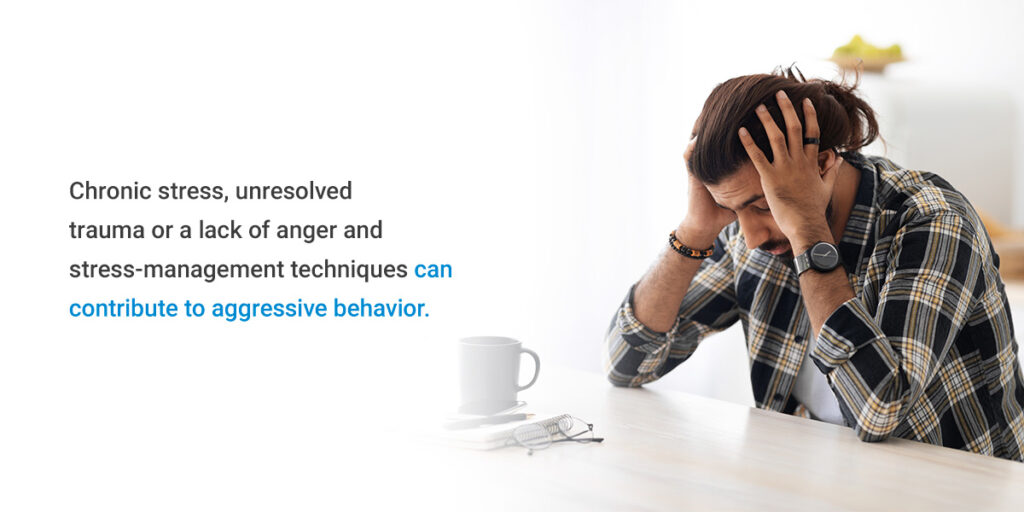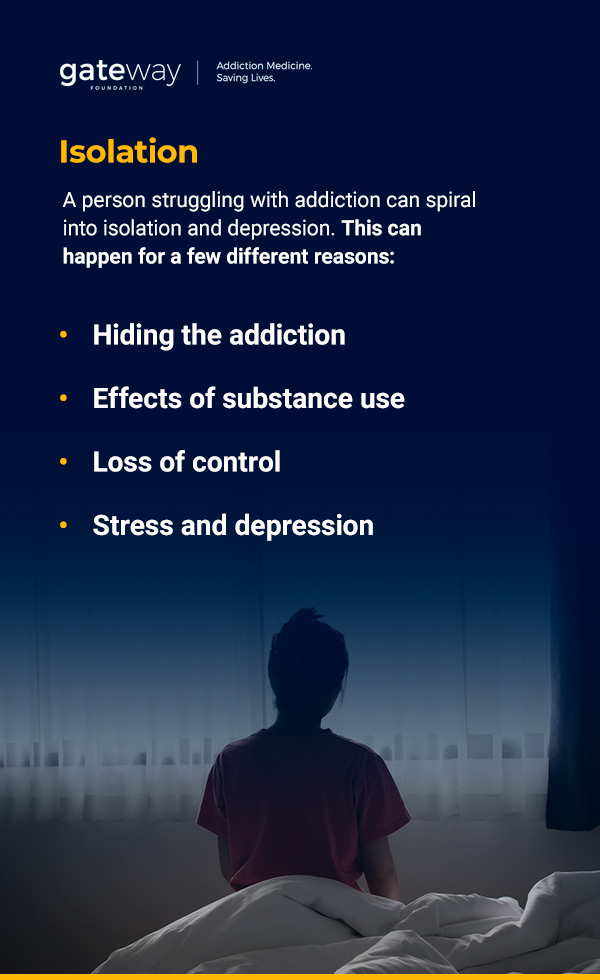- Jul 22
- Mental Health Treatment

Substance use disorder significantly impacts a person’s life, damaging health, relationships, careers, and finances. Perhaps the most significant impact, however, is on the brain. Substances affect the brain differently depending on the type of substance it is and the individual’s health, habits, and other factors. Studies show that substance misuse can change the important parts of the brain that we rely on to function, feel pleasure, regulate emotions, exercise impulse control, and could even inhibit the ability to sleep or breathe.
If you or someone you know struggles with addiction, you might notice personality and behavioral changes, such as withdrawing from loved ones, secrecy, or increased risk-taking. Addiction is a treatable condition, and professionals can help you overcome the cycle. Continue reading to learn how substances change your personality and how to get help.
Can Addiction Change Someone’s Personality?
Addiction can change a person’s behavior and personality in ways that make them seem entirely different. The brain regulates our essential functions, letting us interpret and respond to all we experience, shaping our behavior. Research shows how addiction can completely alter brain structure by affecting its reward circuitry in the prefrontal cortex.
When a healthy and pleasurable experience activates the reward circuitry, dopamine signals that it is something to be remembered. This dopamine signal causes changes in neurons, making it easier to repeat the activity without thinking about it. Since substances can cause euphoria, they produce more significant dopamine surges, reinforcing the connection between consuming the substance and pleasure. Dopamine essentially teaches the brain to seek substances at the expense of healthier activities.
As a result, consistent substance use can cause many behavioral changes we commonly see in those with addiction. As substances or alcohol become a primary focus of your loved one’s life, they may prioritize substances over relationships, work, school, and even life itself. You may notice addictive behavior and personality changes as cravings take hold. The individual may withdraw from friends and family or become more and more secretive about their activities.
Some personality changes are specific to certain substances. For example, using illicit stimulants could lead to restlessness, aggression, delusions or anxiety, and depression, while some opioid misuse could cause problems with attention, memory challenges, lack of awareness and coordination, or agitation. Substances can cause persistent changes in your personality and brain, which is why addiction is considered a relapsing disease. People in addiction recovery are at an increased risk of returning to substance use, even years after quitting.
10 Ways Addiction Changes Your Personality
Addiction is a chronic disease that can change how we think, feel, and act. While many people experience withdrawal symptoms after quitting, many of these negative effects can persist years after stopping the substance use. Here are 10 ways addiction can change your personality:
1. Increased Secrecy
People with substance use issues often become secretive and take more care to protect their privacy. They may talk less and become suspicious when people ask them questions. They may be wary of others trying to get information out of them and withdraw from others to avoid divulging where they’ve been or what they have been doing.
There could be one or more reasons for this. They may know that friends and family members would disapprove of their substance misuse or illicit drug use. This can make the person with substance or drug addiction aware of their struggles. They don’t want their loved ones to know how often they are taking substances or that they are taking them at all. They may downplay the severity of the addiction and lie to themselves to justify their addiction. This can lead to suspicion, mistrust, and strain in relationships.
Second, they may seek illicit substances and be concerned about getting into legal trouble or causing legal problems for others. They may become more secretive about their lives and go to great lengths to cover up their behavior.
It’s not uncommon for people with addiction to lose trust in others. They may see others who stand in their way as a threat, becoming anxious or paranoid as they cut themselves off from society and those who want to help them.
2. Aggression and Anger

As addiction progresses, individuals might find it more difficult to defend their addiction, which can lead to verbal or physical aggression. Individuals can even become violent towards those who try to help them quit substances, leading to further issues. According to research, there is a correlation between addiction and anger.
This can be from withdrawal symptoms and the effects of the substance, though other factors can play a role. Chronic stress, unresolved trauma, or a lack of anger and stress-management techniques can also contribute to aggressive behavior. The individual may feel angry at themselves for having an addiction and take out their frustrations on others.
Alcohol has long been associated with anger, with drinking causing certain people to become aggressive. There are many reasons why this can occur:
- Disinhibition: Intoxication can cause people to have reduced control over impulses or urges. As a result, it can make it difficult for them to suppress aggression that is not appropriate for the situation.
- Impulsivity: Chronic alcohol use can decrease the function of the prefrontal cortex, affecting impulse control. As a result, people may act out aggressively while under the influence.
- Impaired cognitive function: Decreased cognitive function can make it difficult to problem solve, control anger and make healthy or safe decisions when drinking. Some individuals may be less likely to read a situation correctly and overreact as a result.
- Low regard for consequences: People are more likely to ignore the future results of their drinking behavior, making it possible to act out angrily or partake in risky activities.
3. Deception
People with addiction can go to various lengths to get their substance. This often includes deceiving or manipulating people around them. If your loved one is struggling with addiction, they may use intense cravings as justifications for these behaviors and become overrun with feelings of guilt and desperation as well.
Additionally, misusing substances or using illegal drugs can reduce a person’s capacity to make decisions and utilize proper judgment skills. They may try to compensate for this lack of control by attempting to control the things or people in their environment. Manipulation tactics are not uncommon at this stage of addiction, and neither is self-deception and denial.
If you are constantly catching your loved one in lies, this behavior may be physiological. As stated, addiction can cause damage to the frontal lobe, which can increase the potential for deviant behavior like risk-taking or lying.
4. Risk-Taking
Since addiction is a chronic disease, it can alter the brain over time as it progresses, causing behavioral changes some might not have believed themselves capable of. Specifically, it impacts the brain’s prefrontal cortex, which is responsible for paying attention, planning, regulating emotions, and maintaining self-control. As substances become the top priority, ethical concerns can be pushed aside.
For instance, people with addiction may be prone to:
- Borrowing or stealing money frequently from others
- Stealing and selling items to sustain their addiction
- Engaging in risky behaviors like sharing needles, driving under the influence, or having unprotected sex
Many substances can affect judgment in different ways. Alcohol is one example — intoxication can cause poor judgment and influence decision-making. Other substances like methamphetamine or cocaine can lead to reckless behavior due to paranoia or overconfidence. As the brain is affected over time, the individual may feel less likely to care about dangerous situations or negative consequences. Many substances can also lower inhibitions, increasing the chances a person will engage in risky behavior while under the influence.
5. Forgetfulness

Substance use disorder can result in memory problems since substances interfere with cognition and disrupt memory processing. If you know someone with an addiction, you may notice them becoming more forgetful as the disease progresses.
Prescription and illegal substances that may cause forgetfulness or even induce amnesia-like effects that include:
Alcohol can also cause memory-related problems, like blackouts. Alcohol-induced memory blackouts can make it difficult to transfer short-term memories to long-term storage.
6. Frequent Mood Swings
Substance use can throw your brain off balance. Cocaine increases dopamine in parts of the brain, and many people experience depression as symptoms diminish. Alcohol may initially relieve symptoms of anxiety, but then the brain overcorrects, making those symptoms worse.
You might feel calm initially and then irritable or aggressive hours later. Mood swings are also often a result of withdrawal symptoms when attempting to quit substances without medical supervision. Some studies show prolonged use can diminish areas of the prefrontal cortex responsible for emotional regulation. As a result, individuals have shifting levels of neurotransmitters and issues regulating their emotions.
Additionally, addiction can worsen mental illnesses like anxiety and depression. You might always feel tense and on guard, feeling as though others are constantly attacking you, causing you to respond irrationally.
7. Depression and Anxiety
Addiction can often cause or worsen depression and anxiety. These conditions commonly co-occur with substance use disorders. They often precede addiction, though they can also result from substance use disorder.
Substance use can often result in poor emotional regulation and may cause many people with addiction to continue misusing a substance in an effort to numb negative feelings.
People with substance use disorders often feel trapped by this cycle, leading to hopelessness and helplessness. Feelings of shame can also cause depression, while the fear of withdrawal can lead to anxiety. Other substances can also cause a person to develop depression or anxiety by disrupting the natural balance of neurotransmitters in the brain and body.
Alcohol and substances can also render certain antidepressants less effective at treating symptoms and even trigger new ones.
8. Paranoia
Addiction can also worsen symptoms of severe mental illnesses like schizophrenia or bipolar disorder, leading to paranoid feelings or behavior. If you or someone struggles with addiction, look for the following signs of paranoia:
- Irrational fear of pursuit or endangerment
- Hypersensitivity or taking innocent comments and looks as criticism or attacks
- Reacting with anger to any perceived attacks on their character
- Controlling or jealous behavior
- Having difficulty calming down
- Acting hostile, stubborn, and argumentative
- Refusing to see their contribution to problems and believing they are always right
- Assuming others are lying to them
- Cold and distant behavior
People with paranoia find it more challenging to distinguish when their thoughts are or are not based in reality, which can cause fear and distress or symptoms of anxiety and depression. Over time, it can make it more difficult for them to form meaningful relationships as they constantly strive to protect themselves from people, places, or situations they believe could harm them.
9. Isolation

A person struggling with addiction can spiral into isolation and depression. This can happen for a few different reasons:
- Hiding the addiction: When a person becomes addicted to substances, friends and family often oppose it by confronting them. These gestures aren’t always well-received, and your loved one may withdraw into isolation to protect their addiction and keep it hidden from others.
- Effects of substance use: Loneliness can be one of the many negative effects of substance use. When a person becomes addicted to substances, it often becomes their primary focus. They may distance themselves from others as they devote more time and energy to their substance.
- Loss of control: Addiction can make people feel like they are losing their grip on reality and believe others wouldn’t understand what they are going through. The isolation can be so strong that it makes them think they are better off alone.
- Stress and depression: People may intentionally isolate themselves due to feeling overwhelmed and stressed from their addiction. As substance use takes over more of their life, they may struggle to handle the demands and pressures of everyday life. They may shut themselves off from family members and friends to cope.
10. Lack of Interest in Activities
In addition to feeling lonely and isolated, addiction can cause individuals to avoid the activities they once enjoyed. Whether it’s playing sports, making art, or listening to music, these interests can lose ground to substance use. As addiction progresses, the person may spend less time with their hobbies and more time obtaining and taking their substance.
People with addiction might also show declined job or school performance as they avoid these essential activities. These negative effects can worsen or lead to depression, which may also cause a loss of interest in things they used to enjoy.
Get Evidenced-Based Addiction Treatment at Gateway Foundation
Addiction and substances change your personality and behavior in many ways, altering brain structure and causing distress. If you struggle with addiction, professionals can help you regain balance in your life and feel like the person you were before substance use.
At Gateway Foundation, we provide several types of evidence-based treatments as well as holistic therapies. This way, you gain treatment and resources for your symptoms and discover how to overcome triggers in the future. Our highly trained therapists can help you explore the changes substance use has caused and learn how to overcome thoughts and behaviors contributing to addiction.
To learn more about our addiction treatment programs, contact us today.



